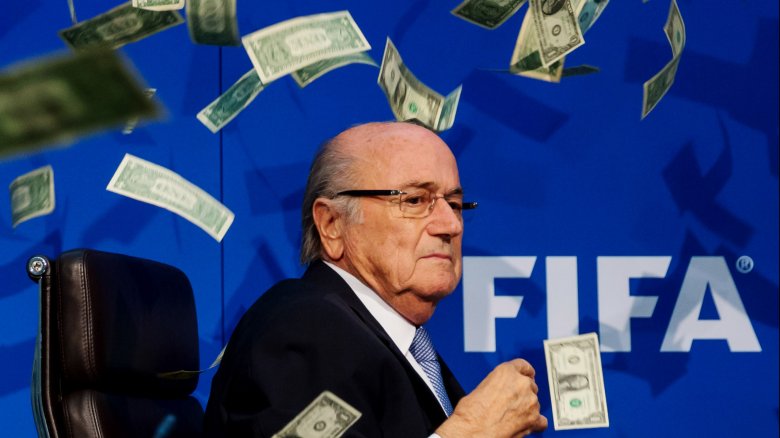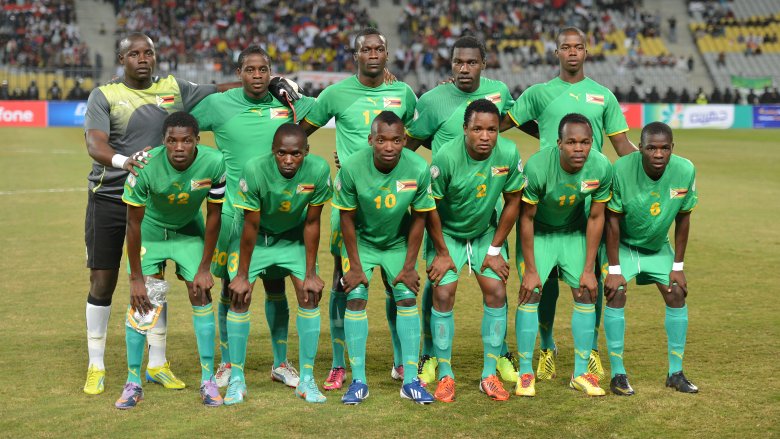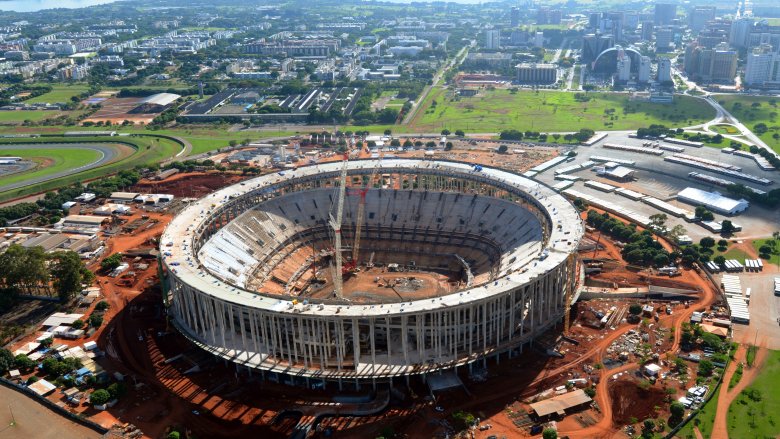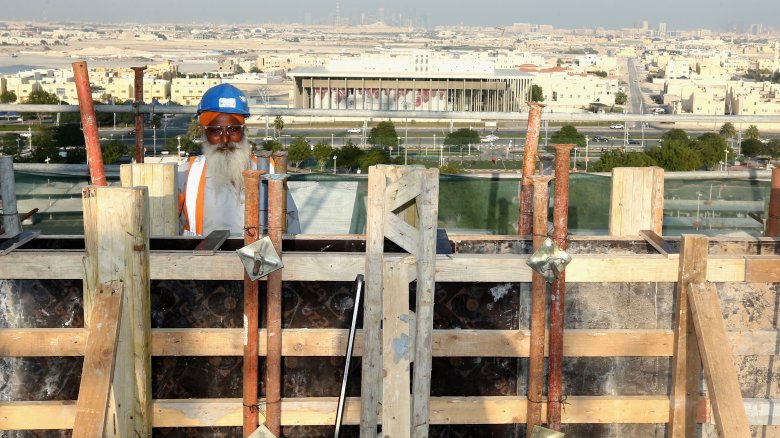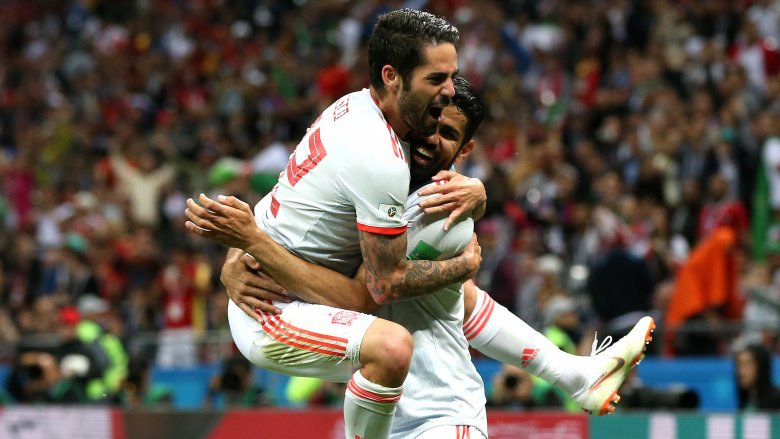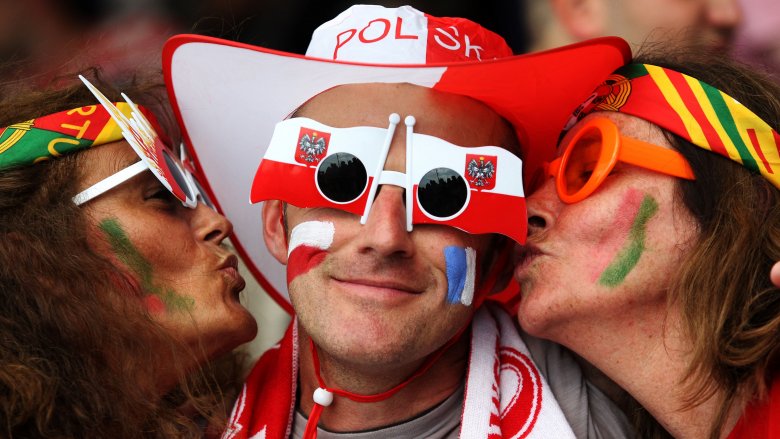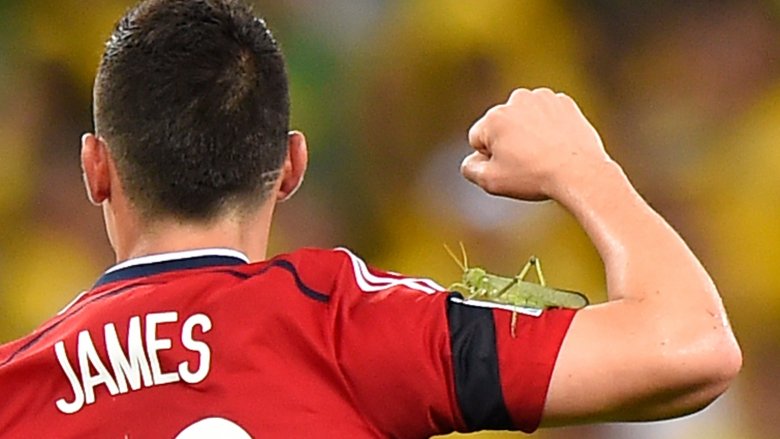The Truth About What Happens Behind The Scenes At The World Cup
Every four years, 32 of the top national football (soccer, to us Yankees) teams from around the globe enter a roughly month-long tournament known as the World Cup. Watched by nearly half of the Earth's population at some point — with more than one billion tuning in just for the final match in 2014 — the World Cup is among the most popular sporting events on the planet.
Clearly, this tourney takes a staggering amount of preparation, much of which is not completed without controversy. From the scandal that rocked the tournament's governing body, the International Federation of Association Football (FIFA), to the billions spent and lives lost just to prepare host cities, the World Cup makes plenty of headlines before, during, and after the first kickoff.
Since the world obviously has no problem focusing on the actual gameplay, we figured we'd take a look at what goes down off the field. This is the truth about what happens behind the scenes at the World Cup.
Red flags for the FIFA brass
On June 2, 2015, longtime FIFA President Sepp Blatter (above) announced his resignation from the post he held for 17 years. It was the culmination of years of investigation into fraud and bribery allegations by not only internal FIFA auditors, but also former MI6 agent Christopher Steele, as well as the IRS and the FBI.
According to The New York Times, Steele began looking into FIFA at the request of "wealthy individuals and corporations supporting England's bid to host the 2018 World Cup." The UK lost that bid in a debacle that included an embarrassing alleged bribery scandal that implicated Prince William and former Prime Minister David Cameron.
Steele concluded that Russia engaged in corruption of its own to win its 2018 bid to host, although this ultimately couldn't be proven, in large part, due to the alleged destruction of the bid team's computers. Steele passed his findings to the FBI, and the U.S. Department of Justice then took the ball and built a case that accused more than two dozen FIFA officials of varying degrees of "racketeering, wire fraud and money laundering conspiracy," reported CNN.
Blatter was eventually slapped with a six-year ban from the sport over charges of making a "disloyal payment" to another former FIFA official. Having narrowly skirted corruption charges, Russia moved forward with its 2018 World Cup preparations, albeit under the heavy specter of foul play.
Missing the World Cup costs countries big time
FIFA officials aren't the only ones to get red cards off the field. National teams have also been excluded due to shady sideline activities. Two teams in 2018 were eliminated from the tournament after being exposed in two very different scandals.
In March 2015, Zimbabwe was "expelled from the preliminary competition" after failing to pay former coach Jose Claudinei Georgini what was owed on his contract following his 2008 dismissal. According to Reuters, stiffing Georgini was just one example of the financial woes that plagued the Zimbabwe Football Association. In the past, the team has actually auctioned off everything from office equipment to artificial turf to pay down debt.
A month later, Indonesia was excluded from World Cup qualifiers and banned "from all international football" for "government meddling in the country's domestic league," according to Reuters. Officials from the Sports and Youth Ministry allegedly interfered with the league, which is a big no-no in the eyes of FIFA.
The dysfunction of both teams is remarkable considering the lofty rewards that come with participating in the World Cup — namely the $9.5 million teams get just for making the finals and the $38 million awarded to the champs. But hey, there's always 2022, right?
If you build it, they'll eventually park busses in it
For host countries, the World Cup promises an unparalleled injection for the local economy. While it's undeniable that host countries' tourism industries enjoy a massive influx of international attendees during the tournament, the justification for spending billions of tax dollars on the event is typically couched in the hope of enjoying economic growth for years to come.
According to NBC News, 2002 hosts Japan and South Korea both reported a "boost" in their overall economies post-Cup. South Korea claimed an estimated "$4.1 billion in direct" and "15.1 billion in indirect economic benefits" as the net effect of its hosting stint, which seems like a valid justification for the hefty upfront price tag of $7 billion. However, according to economist Simon Bowmaker, who spoke to The Washington Post, the reality is that "most areas that host a major sporting event grow at a slower pace than normal after the event is over."
That hasn't stopped Russia from going even bigger. According to ESPN, the former Soviet Bloc nation is expecting a $31 billion return on its staggering $11 billion investment hosting the 2018 tournament. Again, that sounds like a worthy investment, but there are plenty of negative World Cup economic post mortem reports as well. Case in point: NPR reported that a $550 million stadium built by Brazil in 2014 is now "a parking lot for busses." Maybe they're really nice busses?
Dogs, drugs, and poor people need not apply
Given the dubious nature of the rosy economic projections for hosting the World Cup, it should come as no surprise that the efforts and expenditure of host nations to stage such an event are always shrouded in controversy. The list of allegedly shady practices that have gone into World Cup preparation is long and grim, so we'll just study two recent examples.
Brazil went to dark and disturbing lengths to obfuscate the crime and poverty issues that plagued its tournament host cities in 2014. According to The Guardian, more than 100 innocent bystanders were killed by stray bullets during "heavy-powered gun battles" between a police and drug gangs in clean-up efforts ahead of the World Cup. Additionally, Al Jazeera reported that "250,000 people across Brazil" were allegedly "forcefully removed from their houses" or "threatened with eviction" to make way for stadium infrastructure projects.
Not to be outdone, Russia allegedly embarked on a campaign of stray dog genocide ahead of the 2018 World Cup. According to The Telegraph, Russian official Alexei Sorokin said, "There shouldn't be any stray animals, they should be destroyed, and that's it." The preferred method of destruction? Poison blow darts. According to The Sun, there are also unconfirmed reports of homeless people being rounded up and placed into "former army camps" away from tournament venues.
Terrible, right? Unfortunately, it gets even worse. Brace yourself, because this next bit could blow you right out of your sold out Nigeria kit.
Workers are literally dying to pull off Qatar 2022
There's a shady backstory to how 2022 host nation Qatar secured its winning bid for the World Cup, but let's focus instead on the human right atrocities allegedly being committed in preparation for the first tournament ever hosted in the Middle East.
According to a March 2015 report by the Independent, a force of approximately 1.5 million migrant laborers — some who were recruited under disingenuous circumstances — are living and working in terrible conditions to get the country's infrastructure overhauled in time. Long hours, dangerous work sites, and squalid living conditions are not even the worst aspects of the gig. By the way, Qatar's kafala system "prevents [migrant workers] from going home without their employer's permission," so they can't even quit.
As a result of this heinous labor arrangement, more than 1,000 workers have already died working on World Cup-related projects, reported the BBC. That number is expected to reach 4,000, according to an estimate by the International Trade Union Confederation. Cries of opposition have grown louder, with mainstream publications going so far as to print headlines like: "Qatar's workers are not workers, they are slaves, and they are building mausoleums, not stadiums."
Bar soap? Sacré bleu!
First of all, we're aware that transitioning from alleged slave labor and World Cup construction worker deaths to the diva demands of teams and players is admittedly a pretty jarring shift in tone, but we also feel that it serves as a nice example of the dichotomy of worlds that exist behind the scenes at the World Cup.
To wit, while militaristic police and drug gangs battled it out on the streets of Brazil in advance of the 2014 World Cup, the French football squad (above) demanded liquid soap for its hotel rooms because "France doesn't have bar soap so players might have trouble," according to Brazilian newspaper Lance (via SB Nation). According to that 2014 report, team Uruguay requested each hotel room be outfitted with "a completely silent air conditioner," which might as well have been a request for unicorn meat available via room service. Team Ecuador required a daily basket of Ecuadorian bananas, and team Switzerland insisted on the construction of a "beach studio" from which team interviews could be held.
While these all seem like exactly the kinds of demands that many celebrities make, perhaps it's an outcrop of players being denied something else...
Save your energy for the field, fellas
There are undoubtedly all sorts of ways in which individual countries prepare for the World Cup, but there seems to be one guiding rule that unites the planet: no bumping uglies before game time.
According to PRI, this restriction dates back to the ancient Greeks, who "saw sperm as a source of masculinity and strength that sportsmen needed." While the science on how shrimpin' the barbie affects athletic performance is still out, coaches have imposed limits. In 2014, Team Mexico was ordered not to dip the wick throughout the entire tournament. The South Africa and UK delegations got similar instructions in 2010, which possibly led to England's goalkeeper "dropping the ball in his own net in the first game." Squads from Bosnia and Herzegovina, Russia, and Chile all stopped shaking the sheets in 2014 as well, according to the Independent, but there have been notable exceptions.
France makes no restrictions. Its team doctor actually advises that making l'amour is "relaxing" for footballers, so long as it doesn't "become an all-night activity." Joining the French is none other than the U.S. of A., whose team coach, Jürgen Klinsmann, told The Washington Post in 2014 that American players were free to shag to their hearts' desire.
While most World Cup players refrain from doing the devil's dance, it's a whole other story with the spectators, who have apparently made something of their own sport out of the World Cup.
GOOOOOOOOOOOOOOOAL!
One of the most interesting behind the scenes happenings at the World Cup has to be the phenomenon of increased birth rates for host countries. According to The Guardian, Germany reported a jaw-dropping national birthrate increase of almost 30 percent, attributed to "the euphoria" of the event being held there in the summer of 2006.
South Africa made a similar claim after hosting in 2010: The number of baby boys reportedly increased, earning the country a net gain of "1,088 extra boys," when compared with "an average during the period from 2003-2012."
Dubious science aside, even countries that didn't host but performed well, also reported birth rate increases. England reported as much after reaching the quarter-finals in 1970 and 2003.
Granted, there are a host of other biological and environmental factors that can contribute to increased birth rates, but we are sure of one thing: The massive amount of booze consumed at these things has to be a factor.
What's next, a flood?
Of all the logistical nightmares that come with preparing for the one million fans expected to attend the World Cup in 2018, we're guessing Russia didn't have "Biblical-style plagues" on its agenda. Unfortunately, that became a reality when agriculture minister Pyotr Chekmarev told The Guardian in January 2018 that he worried locusts could possibly destroy the soccer fields.
Chekmarev's fears apparently stemmed from the fact that "locusts love it where there is lots of green," and the host city of Volgograd was already "infested with locusts," as was another roughly "million hectares of land in southern Russia."
Russian FIFA official Alexei Sorokin downplayed the locust threat, saying, "the grass on the pitch is very short and it's sprayed with certain substances," reported ESPN. "We are trying to look at this with humor."
As far as we can tell, there haven't been any issues with locusts during the 2018 tournament (the above photo is actually from the 2014 World Cup in Brazil), so Russia must have gotten a handle on this thing one way or another. However, given the way Russia chose to deal with its stray dog problem, we're not sure we want to know the specifics.
Nobody touches Viking pride
The tiny Nordic nation of Iceland had every reason to be excited for the 2018 World Cup. After all, this marks the first time its qualified for the finals. According to The Guardian, it's also the "smallest nation to ever qualify for a World Cup finals."
Perhaps unsurprisingly then, a jaw-dropping 20 percent of the country's entire population — around 335,000 soccer diehards — applied for tickets to the World Cup. To put that into perspective, that would be like 65 million Americans all deciding to go on the same road trip.
In fact, in order for America to rival this kind of national enthusiasm, the entire populations of California and Texas would have to get on planes, fly to Russia, and choreograph some kind of Founding Fathers' flossing routine that would in no way compete with this epic fandom right here. That's just never going to happen.

